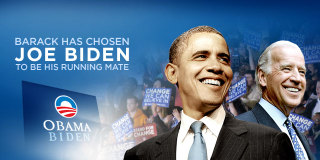Now is the time for all good men (and women) to come to the aid of the party.
The 2008 election will be decided over the next month, but perhaps not where you think.
Republicans can always win an air war. They have been doing this for a generation. It is what they do. We are inclined to buy their crap so they spit it out, the knees jerk, and that’s that.
But there is another way. I have been exploring it, both from my standpoint as a tech reporter and as a Barack Obama supporter, over the last few days.
I call it the ground war. It’s a fascinating story. It’s partly a computer story. It’s also, partly, a human story. It’s a story you can be part of, if you choose. But your choice, whatever it is, will decide this election.
Both parties have access to the same voter lists. The Obama campaign
has made its list available for canvassing, in 25-voter units.
The aim is to create an accurate list of voters and Obama supporters, at ground level, who can then be activated when the time comes. And it’s coming.
You can start the process from your desktop. Without talking to anyone.
Once you’re signed as an online volunteer, your first option is to contact
neighbors on foot. The print control program is problematic. It
delivers a page-long questionnaire on each voter that can splash onto
the next page. (Use print preview and shorten it.) My list came to 34 pages, a lot of
ink and paper. If you want you can even print flyers. I chose not to.
Your mission (once you print a list) is
to see if each voter lives where the list says, see if they support Obama,
and then query them about their favorite issues and whether they might
help the campaign.
The initial quality of this data is poor. That’s important to know. When the
robo-calling starts, and it’s time to get the vote out, the work of
neighborhood canvassing will have improved the data and made the campaign much more efficient.
Since the Obama organization is now tied directly to the Democratic
National Committee, it will also help your state and local party.
This is ground work at its most wearying. I went out near dinner time
and was amazed at how many people weren’t home — even when cars were
in the driveway. Others were very reluctant to talk. They assume that
all strangers are selling something.
A full 90 minutes’ work yielded just one pure success. I talked to a
man through his wife, who held the door open and answered my questions,
always ready to shut it on me. And this was a couple who live just a
street away from me.
I learned a lot about my neighborhood. It is amazing how diverse it is,
not just racially but economically and socially. I found one home
newly-renovated, with a huge garage out back ready to be converted into
a rental unit, and a very suspicious owner who proclaimed himself a
Libertarian. Two doors down I found an old bungalow packed with
furniture like a warehouse, and a middle-aged woman who insisted she
didn’t live there working with some fabric on a huge table where the
living room should be.
I found scared, old, poor people living just a few days from nouveau
riche real estate people. I found that the people behind my house were
recently run out by the law, and their home boarded up. I’m going out
again later today and will learn more.
I don’t want to romanticize this. This work is very hard. It is a very
inefficient use of my time. But this is the scut work of politics. This is
what a political ground game looks like. And this is what Obama has, what John McCain does not have.
After completing one stage of my rounds I entered my data. I had
directly contacted 8 voters, most of whom had moved away. But the
software offered some atta-boys. It said I need contact just two more
people to get past "level one" — whatever that is. It said I’m in
"64th place," whatever that is.
That’s validation. It is coming from a computer, from a database, but
it’s real validation. This is some of the most brilliant political
programming — as in computer programming — I have ever seen. It’s a
huge step forward in marketing. Connecting the real to the virtual is what every business most wants to do.
Now multiply my humble rounds by 1 million, or 2 million, or 10
million. If 10 million people just get past Level One, each personally
contacting just 10 voters, that’s 100 million voters contacted. If you
can convince 10 people to vote your way, and make sure they get out,
that’s enough to win this election in a landslide.
This is how the 2008 election will be won or lost. Not at rallies. Not
on TV. It is up to us, to you and to me. Will we make the phone calls?
Will we hit the streets, today, tomorrow — for the next two months?
On that question hangs the judgment of history.












